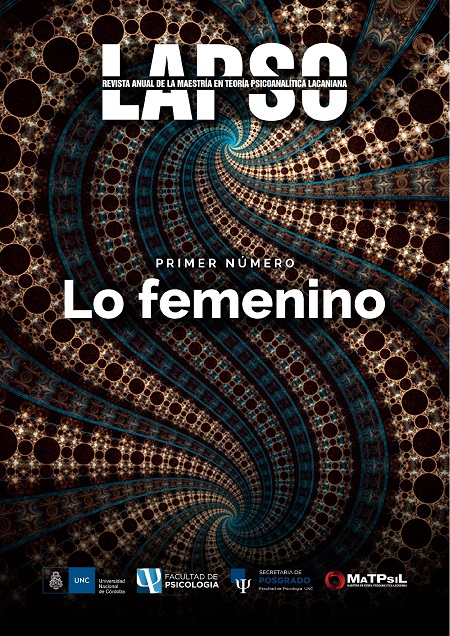The imitation game: hysteria and the discourse of techno-science
Keywords:
femininity, imitation game, mass media, psychoanalysisAbstract
This paper intends to review the mutual benefit between the media and psychoanalysis. It argues that psychoanalysis needs increasingly recognize its effectiveness as a theory of the media in its discussion on contemporary forms of social bonds whose effects are manifested in the clinic. Also it suggests that both Turing and Lacan, in its different forms, established that thought is an effect of symbolization that does not necessarily require a human brain.References
Biers, K. (2015). ‘The Typewriter’s Truth’ in Stephen Sale and Laura Salisbury (eds), Kittler Now: Current perspectives in
Kittler Studies. London: Polity, 2015, pp. 132-54.
Copeland, B. Jack (2004). (ed) The Essential Turing: Ideas that Gave Birth to the Computer Age. Oxford: Oxford University
Press.
Fink, B. (1995). The Lacanian Subject: Between Language and Jouissance. Princeton: Princeton University Press.
Freud, S. (1993). ‘The Rat Man or Notes Upon a Case of Obsessional Neurosis’ in Three Case Histories New York:
Macmillan.
Hodges, A. (2014). Alan Turing: The Enigma. London: Vintage.
Kittler, F. (1990). Discourse Networks 1800/1900. Stanford, CA: Stanford University Press.
Kittler, F. (1997). Literature, Media, Information Systems, edited and Introduced by John Johnston. London: G&B Arts.
Kojève, A. (1989). Introduction to the Reading of Hegel: Lectures on the Phenomenology of Spirit (ed) Allan Bloom.
Ithaca: Cornell University Press.
Lacan, J. (1953). ‘The Neurotic’s Individual Myth’ Text edited by Jacques-Alain Miller. The French text appeared in Issue
No. 17 of Ornicar? Periodical Bulletin of the Champ Freudien.
Lacan, J. (1988). The Seminar of Jacques Lacan: Book II: The Ego in Freud’s Theory and in the Technique of Psychoanalysis,
trans. John Forrester. Cambridge: Cambridge University Press.
Lacan, J. (1992). The Ethics of Psychoanalysis: Seminar VII, trans. Dennis Porter. London: Routledge.
Lacan, J. (1993). The Psychoses: The Seminar of Jacques Lacan Book III 1955-56, ed. Jacques Alain Miller, tr. Russell Grigg,
London: Routledge.
Lacan, J. (1999). Encore: Seminar XX, trans. Bruce Fink. New York: Norton.
Lacan, J. (2007). The Other Side of Psychoanalysis Seminar XVII, trans. Bruce Fink. New York: Norton.
Leavitt, D. (2007). The Man Who knew Too Much: Alan Turing and the Invention of the Computer. London: Phoenix.
Merriam, M. (2015). ‘The Unvarshished Tales of the Brother’s Grimm: A Conversation with Jack Zipes’ in World Literature
Today. July 29 2015. Worldliteraturetoday.org
Miller, D. (2005). ‘Obsession: A Name of the Superego’ The Symptom. Online Journal for Lacan.com
Soler, C. (2002). “Hysteria in Scientific Discourse” en Reading Seminar XX: Lacan´s Major Work on Love, Knowledge, and
Feminine Sexuality. NewYork: State University of New York Press.
Downloads
Published
Issue
Section
License
Copyright (c) 2018 Lapso

This work is licensed under a Creative Commons Attribution-NonCommercial 4.0 International License.
Se permite la generación de obras derivadas siempre que no se haga con fines comerciales. Tampoco se puede utilizar la obra original con fines comerciales.


